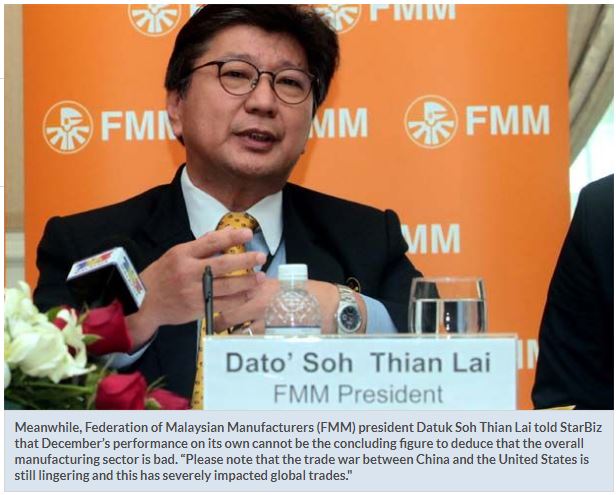Big cloud over Malaysian manufacturing, PMI at lowest level
PETALING JAYA: A big cloud hangs over the Malaysian manufacturing sector after its Purchasing Managers’ Index (PMI) for December 2018 hit its lowest on record.
An economist said there was a significant fall in demand, while export orders dropped for the first time since June resulting from weakness across the Asia-Pacific region.
IHS Markit economist Joe Hayes is also of the opinion that the index dip will heavily weigh on the final gross domestic product (GDP) reading for 2018.
Meanwhile, Federation of Malaysian Manufacturers (FMM) president Datuk Soh Thian Lai told StarBiz that December’s performance on its own cannot be the concluding figure to deduce that the overall manufacturing sector is bad.
“Please note that the trade war between China and the United States is still lingering and this has severely impacted global trades.
“The other reason is also due to cyclical factors. December has always had the lowest outputs due to the longer festive season and holidays,” he said.
The Caixin China General Manufacturing PMI, which was also released yesterday showed a drop from 50.2 to 49.7, the first time the reading went below 50 since May 2017.
The gloom was confirmed after the Nikkei Malaysia Manufacturing PMI took a plunge to 46.8 for the last month of the year from 48.2 in November, the lowest level recorded since the survey started six-and-a-half years ago.
Readings above 50 indicate an expansion while a number below 50 indicates a contraction.
IHS Markit, which compiles the survey, said harsher reductions in productions and new business pulled the PMI lower into contraction territory.
It added that concerns over demand led companies to use existing stocks to clear backlogs and cut back on input purchasing.
It also said that as a result, supply chain pressures alleviated while purchasing costs increased to a weaker extent.
“Nonetheless, confidence strengthened amid upbeat sales forecasts for 2019,” IHS Markit said in a statement.
Hayes on the other hand suggested that prospects for the start of 2019 are likely to remain negative with the fall in production and with firms reducing inventories of inputs and finished goods.
The survey also stated that Malaysian manufacturers received unfavourable demand from overseas last month.
“Orders from clients in European and the Asia-Pacific regions were reportedly down on the month. That said, the fall in foreign demand was only mild.”
MIDF Research foresees an expansion in industrial production index (IPI) at a steady pace in the fourth quarter of 2018 and in 2019 amid dwindling trade tension effects, strong global demand, optimistic business environment and volatility risks in global commodity prices and currencies.
It said exports in October 2018 grew 17.7% and 16.2% on an annual and monthly basis respectively, reaching a new high of RM96.4bil.
Manufactured goods – being the largest exports contributor – increased by 19.9% year-on-year (y-o-y) in October compared with 7.9% y-o-y in September.
Malaysia’s industrial production expanded by 4.2% y-o-y in October last year, which was above the market estimate of 3.3%.
The Nikkei Malaysia Manufacturing PMI report also stated that inventories were depleted to the greatest extent since November 2016 while backlogs of work were reduced to a near one-and-a-half-year peak.
Producers scaled back on input purchasing, resulting in a dip in buying activity for a third consecutive month.
A stagnation in employment after six straight months of job creation also fuelled the declining health of the manufacturing sector with resignations affecting the loss of growth momentum.
Operating expenses also continued to increase due to unfavourable exchange rate movements and higher raw material costs.
The inflation rate eased to a four-month low and while selling prices subsequently increased in December, competition and discount requests restricted it to a mild pace.
Malaysia is one of two Asean countries with a solid decrease in the health of the manufacturing sector, with neighbouring country Singapore taking a deeper plunge from an expansion of 53.8 in November to a contraction of 46.0 last month.
The Nikkei Asean Manufacturing PMI edged down to 50.3 from 50.4 in November, indicating a further slight improvement in the health of the Asean manufacturing sector.
David Owen, another economist at IHS Markit, commented that the survey on Asean manufacturers indicated that the recent fall in raw materials prices such as crude oil and metals translated into the weakest rise in input costs for over two years.
“The softer rate of inflation was undoubtedly welcomed by companies to help ease pressure on margins.
“Output growth remained marginal but relatively in line with the average for 2018, while new orders rose at a slightly faster rate,” he said.
Source: https://www.thestar.com.my/business/business-news/2019/01/03/pmi-at-lowest-level/#bUe3l2ouHWCGiZqp.99


 English
English




